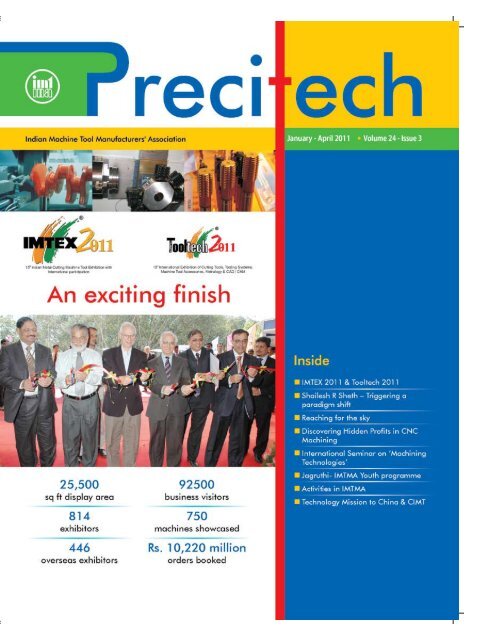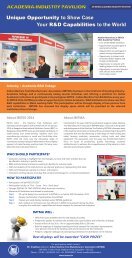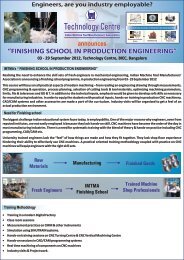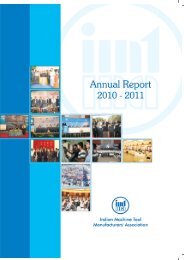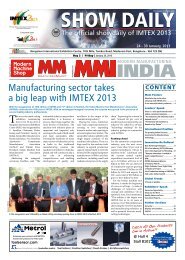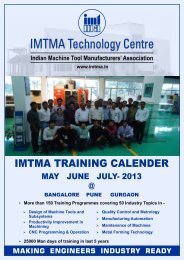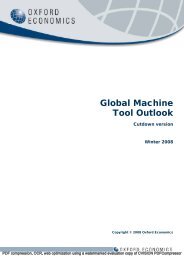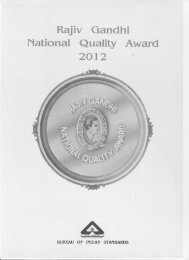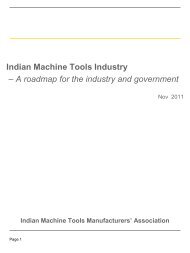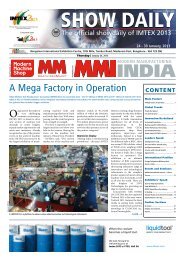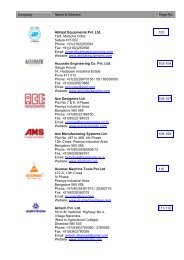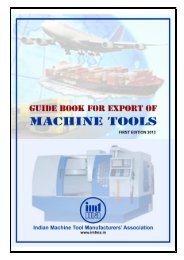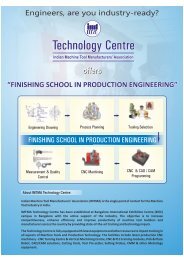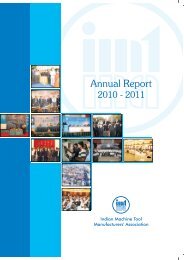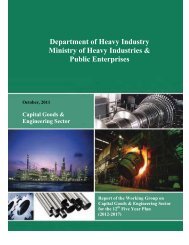IMTEX 2011 & Tooltech 2011 - Indian Machine Tool Manufacturers ...
IMTEX 2011 & Tooltech 2011 - Indian Machine Tool Manufacturers ...
IMTEX 2011 & Tooltech 2011 - Indian Machine Tool Manufacturers ...
Create successful ePaper yourself
Turn your PDF publications into a flip-book with our unique Google optimized e-Paper software.
<strong>IMTEX</strong> <strong>2011</strong> & <strong><strong>Tool</strong>tech</strong> <strong>2011</strong><br />
Being the largest trade show of its kind in South and South<br />
East Asia, <strong>IMTEX</strong> <strong>2011</strong> along with the concurrent <strong><strong>Tool</strong>tech</strong><br />
<strong>2011</strong>, was held from 20 to 26 January <strong>2011</strong> at BIEC,<br />
Bangalore.<br />
The 15th <strong>IMTEX</strong> reflected a resurgent and competitive<br />
India and an optimistic global machine tool industry.<br />
An exhaustive range of innovations and technological<br />
refinements in the complete product segment of metal<br />
cutting machine tools was on display during the event.<br />
Occupying a net space of 25,500 square metres, around<br />
562 exhibitors from around the world showcased 750<br />
machines valued at Rs. 14,000 million.<br />
<strong><strong>Tool</strong>tech</strong> <strong>2011</strong> featured the newest trends in cutting tools<br />
and tooling systems from all across the globe. It had 252<br />
companies exhibiting their latest innovations.<br />
Key Attraction<br />
The key attraction of displays included dramatic<br />
improvement in aesthetics and ergonomics of machines.<br />
Some of the recent technologies / solutions on show<br />
included contemporary developments of five-axis<br />
machines; use of latest coolant techniques; increased use<br />
of high-level automation; and greater focus on robotics<br />
in manufacturing requirements. A prominent aspect was<br />
the dominance of CNC machines in almost all exhibition<br />
stands.<br />
The participation in the two exhibitions was truly international<br />
with overseas exhibitors numbering 446 of the total 814<br />
exhibitors. The foreign participation came from a total of 23<br />
countries along with eight country-group participants from<br />
China, Czech Republic, Germany, Italy, Singapore, Spain,<br />
3
Taiwan and United States – clearly reflecting the process<br />
of globalisation of the machine tool industry in India. The<br />
other participants came from Australia, Austria, Denmark,<br />
Finland, France, Hong Kong, India, Israel, Japan, Korea<br />
Portugal, Switzerland, Thailand and the UK.<br />
The event had a grand opening with inauguration by<br />
Mr. Arun Maira, Member, Planning Commission of India,<br />
along with Dr. K. Radhakrishnan, Chairman, <strong>Indian</strong> Space<br />
Research Organisation as well as Mr. Arvind Kapur,<br />
Vice President, Automotive Component <strong>Manufacturers</strong><br />
Association of India.<br />
Response<br />
The seven-day event recorded a massive footfall of 92,500<br />
business visitors. The visitors comprised a blend of decisionmakers,<br />
managerial level executives, technocrats as well<br />
as technical workforce representing the entire spectra of<br />
the manufacturing industry, from world over. They came<br />
with the objective of not only witnessing the new facets of<br />
manufacturing technologies, but also to firm up business<br />
decisions, forge strategic alliances, and even develop<br />
vendor bases. The event recorded a total value of orders<br />
booked to the tune of Rs. 10,220 million and serious<br />
enquiries worth another Rs. 70,000 million.<br />
4
Shailesh R. Sheth<br />
Triggering a paradigm shift<br />
DNA of this company. From being a trading company, he<br />
transformed PMT to become an important manufacturer of<br />
machine tools and triggered an era of global cooperation<br />
through partnerships with reputed foreign companies.<br />
For his outstanding and far-reaching achievements in<br />
propelling the <strong>Indian</strong> machine tool industry towards global<br />
excellence, Mr. Sheth was honoured with the “IMTMA - H.<br />
R. Gupta Lifetime Contribution Award” at the <strong>IMTEX</strong> <strong>2011</strong><br />
Inauguration Ceremony.<br />
“Do not go where the path may lead; go instead where<br />
there is no path and leave a trail”. These words of Ralph<br />
Waldo Emerson truly portray the philosophy of one of<br />
IMTMA’s most outstanding and outspoken office-bearers<br />
– Mr. Shailesh Rajnikant Sheth.<br />
Mr. Sheth’s enormous contribution to the <strong>Indian</strong> machine<br />
tool industry’s journey towards quality, productivity and<br />
beyond all competitiveness is very well known. What is less<br />
documented is his unparalleled foresight in visualising a<br />
leading global position for the industry.<br />
Under his astute guidance, the ‘VISION’ Conferences,<br />
‘Technology Missions’, Summits and Technology Seminars,<br />
raised IMTMA’s capabilities to new heights. The person<br />
who coined the word “stretch goals” must have met or<br />
seen Mr. Sheth in action. For him a setback is only a new<br />
challenge – and Mr. Sheth loves challenges.<br />
IMTMA was the first industry Association under Mr. Sheth<br />
that brought together competing members to together<br />
evolve a challenging vision and matching action plans.<br />
His optimism in the face of new challenges and clarity of<br />
thoughts, which he also articulates extremely well, have<br />
been a hallmark of his long-standing relationship with the<br />
industry as also with the Association.<br />
With an excellent blend of strong fundamentals acquired<br />
during his graduation from IIM Ahmedabad and experience<br />
spanning over four decades, Mr. Sheth played a defining<br />
role in charting the course at several leading companies<br />
and the <strong>Indian</strong> machine tool industry as a whole.<br />
Earlier in his career, during a 22 year long association with<br />
Perfect <strong>Machine</strong> <strong>Tool</strong>s Group (PMT), Sheth changed the very<br />
With typical humbleness, Mr. Sheth says, “A lot of my success<br />
is not so much so because of what I did but because of<br />
what many machine tool manufacturers did on my advice,<br />
recommendations and assessments. Companies took the<br />
risk that time and they succeeded. It is their effort that is<br />
being lauded rather than my few words of advice. This<br />
award is a vote of confidence in the fact that the <strong>Indian</strong><br />
machine tool industry is well on its way to transformation<br />
and becoming globally competitive.”<br />
Bubbling with optimism, Sheth foresees great potential in<br />
the <strong>Indian</strong> machine tool industry and says, "The momentum<br />
of the industry is back. New markets such as aerospace,<br />
healthcare, energy have helped the industry focus on highend<br />
technology and innovation.”<br />
Advising machine tool makers to be level-headed despite<br />
the sudden upsurge in business he remarks, “<strong>Manufacturers</strong><br />
must not take undue advantage of the current explosive<br />
demand growth situation. This is the time for mature<br />
behaviour and one should not be carried away by the<br />
amount of profits made. Also, manufacturers should not get<br />
complacent and should not stop the effort to continuously<br />
improve and change.”<br />
Mr. Sheth has represented the <strong>Indian</strong> machine tool industry<br />
in many international fora and authored two seminal<br />
research studies on the industry. As a corporate advisor<br />
in management and manufacturing technologies and an<br />
independent director in several leading companies, Mr.<br />
Shailesh Sheth continues to guide, mentor and inspire<br />
machine tool makers towards meeting new challenges<br />
and reaching greater heights – more importantly in a new<br />
‘avatar’ as the “chief mentor” of the second-generation<br />
entrepreneurs, emerging leaders and young professionals<br />
of the machine tool industry.<br />
5
Reaching for the Sky<br />
“You have got to jump off cliffs and build your wings on the<br />
way down” – Ray Bradbury<br />
Truly building his own wings and reaching new heights, Mr.<br />
A. V. Sathe’s entrepreneurial achievements and immense<br />
contribution towards enhancing competitiveness of the<br />
metalworking machine tool industry in India, rightly deserves<br />
to be acknowledged and celebrated. Identifying and<br />
appreciating his contributions, he was bestowed with the<br />
second “IMTMA - Vinod Doshi Outstanding Entrepreneur<br />
Award in <strong>Machine</strong> <strong>Tool</strong>s” at <strong>IMTEX</strong> <strong>2011</strong>.<br />
It takes a lot of courage for one to abandon a comfortable<br />
job and enter into a completely alien world, with an urge<br />
to make a difference, not for oneself but for the world. Mr.<br />
Sathe is among those few courageous ones. After graduating<br />
from IIT Bombay in 1963, he worked with the Central<br />
Manufacturing Technology Institute (CMTI) and went on to<br />
become the Head of the Design Department. After 13 years<br />
in CMTI, he set-up his a company of his own.<br />
Explaining why, he says: “frankly speaking, I was quite<br />
happy, working at CMTI. The work atmosphere was great.<br />
However, I felt that the <strong>Indian</strong> machine tool industry needed<br />
to take the optimum advantage of expertise available at<br />
CMTI.”<br />
Despite the satisfaction of ensuring that Pragati is a<br />
world class brand which is giving a tough competition to<br />
recognised European brands, Mr. Sathe has apprehensions<br />
about the growth of the <strong>Indian</strong> machine tool industry.<br />
He says, “Our country possesses twin advantages of<br />
‘engineering strength’, and ‘low labour cost’. With this<br />
combination, we should be dominating the machine tool<br />
world but the reality is exactly the opposite. India’s share in<br />
world’s machine tool production is less than 1% and with<br />
such a low share, it is no surprise that the world market<br />
gives scant respect to <strong>Indian</strong> machine. It is necessary to<br />
introspect and work to change the situation.”<br />
Stating that he encountered no problems as an entrepreneur,<br />
he encourages many more to take up such challenges<br />
and courageously strive towards building up the <strong>Indian</strong><br />
machine tool industry.<br />
“There is enough potential and enough opportunities<br />
to explore in India. Participation in <strong>IMTEX</strong> fairs, for one,<br />
has given us a good exposure in the world market. Also<br />
government organizations like CMTI have a lot to offer.<br />
When these are explored and utilized to the fullest, nobody<br />
can stop India from becoming a major force in the global<br />
machine tool market,” says an optimistic Sathe.<br />
His ambition to create world-class machines made in<br />
India led to the inception of Pragati in 1976. Today, it is<br />
a well established company which employs 300 people.<br />
Its products are exported all over the world, including<br />
Germany and China.<br />
“The combination of 'modern technology' and 'reasonable<br />
pricing' is the key to our success in the market. Today, we<br />
can compete with any country, including China and Taiwan.<br />
In fact, we see big potential in the Chinese market and are<br />
building a plant near Shanghai which is expected to be<br />
inaugurated in January 2012,” says a proud Mr. Sathe.<br />
Pragati at a glance<br />
Pragati is part of the Ace - Micromatic Group, which was established in 1976. It has two plants in Bangalore<br />
and one in Yadrav (near Kolhapur). A new plant in Shanghai is coming up on a two acre plot, with 4880<br />
square metres built-up area. Pragati manufactures machine tool accessories like tool turrets, automatic tool<br />
changers (ATCs) and chucking cylinders. It achieved a turnover of Rs. 910 million last year. 40 % of Pragati’s<br />
turnover comes from exports and it is aiming to increase its turnover by at least 50 % this year. Pragati is also<br />
connected to the FIE group of Ichalkaranji. In FIE, control on the cost of production is an ongoing process<br />
and Pragati also follows the same path and regularly reviews production process to reduce costs.<br />
6
Discovering Hidden Profits in<br />
CNC Machining<br />
applications all aimed at enabling CNC users to discover<br />
hidden profits.<br />
“For cycle time reduction we have CAPSturn and CAPSmill<br />
- CNC cycle time reduction and programming software;<br />
for downtime reduction we have NCnet - DNC system and<br />
Lean Works-framework for MES (Manufacturing Execution<br />
Systems); for reducing ignorance in CNC technology we<br />
have CAMLab, NCycloturn and NCyclomill for training<br />
on CNC technology and CNC programming. We have<br />
succeeded in bringing the activity of CNC programming<br />
down to the shop floor and enabled operators to be<br />
programmers,” clarifies Das.<br />
A chance meeting, after a long time, of three boyhood<br />
friends who had become engineers and were bored of<br />
their jobs, resulted in the founding of a company whose<br />
name has become a byword in the field of software which<br />
enables reduction of cycle time and down time in CNC<br />
machine tools. The company is the Bangalore-based<br />
CADEM Technologies and the founders are Mr. G. V.<br />
Dasarathi Das, Mr. S. K. Bhagavan and Mr. D. Srihari.<br />
CADEM’s first product was NCpack, which read a manually<br />
written CNC program and simulated the tool path<br />
graphically on a PC. It was designed to replace program<br />
entry and transfer through punched tapes.<br />
“The product took two years to develop, during which the<br />
company had zero revenue and our savings were wiped<br />
out. The first copy was sold to Wg. Cdr. Anantharam of<br />
Dhatu Nirman in Bangalore. He saw the half-finished<br />
product and placed an order, which was a huge morale<br />
booster for us. CADEM is still indebted to him for this. Our<br />
product offered much more than the imported PPRs (Printer<br />
Puncher Readers) for a fraction of their cost” recalls Das.<br />
The company is now 22 years old and has about 4000<br />
installations of all their products put together in India and<br />
abroad. When the going was good in Europe and US 30%<br />
of its revenue used to come from exports to these areas.<br />
It had 16 resellers and supported 5 languages: German,<br />
Italian, Spanish, Dutch and Korean.<br />
“Our dream is that five years from now, there will be a<br />
CADEM product in every production machining shop floor<br />
in India,” says Das. “We also want to be big in education.<br />
Currently, there is a wide gap between the skills that<br />
industry needs and what is imparted in our ITI, Diploma and<br />
Engineering institutes. We want to narrow this gap in the<br />
years to come, both through our products and through our<br />
3i initiative (which stands for Industry Institute Interaction)<br />
which we provide as a free service to educational institutes.<br />
NCnet Lite DNC software is available as freeware on our<br />
web site, with DNC parameters for 100+ CNCs.”<br />
Shortly after this, the company developed a PC-based CNC<br />
controller for which it won a CMTI-PMT trust award. The<br />
controller was used by a couple of small firms making CNC<br />
training machines and small industrial machines. CADEM<br />
tried to get some big machine tool builders interested in<br />
the controller, but sadly did not succeed. Otherwise there<br />
would have been an <strong>Indian</strong> CNC controller long ago.<br />
CADEM’s current range of products are for three distinct<br />
7
International Seminar on<br />
‘Machining Technologies’<br />
The Association organised the fourth International Seminar<br />
on ‘Machining Technologies’ on 18 and 19 January, <strong>2011</strong><br />
in Bangalore. The seminar gave a thrust to the evolving<br />
trends in metal-cutting solutions.<br />
Industry experts and domain leaders from Germany, Italy,<br />
Israel, Japan, Switzerland, United Kingdom, United States<br />
of America, Singapore and India shared their experiences<br />
on the latest developments in machining.<br />
Mr. S. Tomonaga, Deputy Managing Director, Toyota<br />
Kirloskar Motor Private Limited inaugurated the seminar<br />
which was followed by the keynote address presented by<br />
Dr. K. Subramanian, Director - Core Technology, Saint<br />
Gobain Co., United States.<br />
The seminar was spread over two keynotes and three<br />
concurrent sessions and covered the key technology areas<br />
related to – auto components machining; aerospace, die<br />
and mould machining; new generation machine tools;<br />
electrical and micro machining; tooling, work holding<br />
and coolants; control systems; as well as measurements<br />
and automation. The seminar was attended by over 300<br />
delegates from 100 companies from across the globe.<br />
Day 1<br />
A Technology Exchange organized in the B2B Session was<br />
an ideal opportunity for participants to interact on a oneto-one<br />
with global leaders in metal cutting technology.<br />
Participants discussed about specific applications,<br />
technology aspects, joint ventures, collaborations,<br />
commercial issues and other events.<br />
The first day had various sessions conducted by different<br />
industry representatives. The Auto Component Machining<br />
session started with presentations from VIGEL, Prawema,<br />
Leistritz and Fraunhofer.<br />
8
In the Electrical and Micro Machining session, the<br />
presentation was made by Robert Bosch, DMG,<br />
Agiecharmillies, Kennametal Extrude Hone and Nagel.<br />
The stream of New Generation <strong>Machine</strong> <strong>Tool</strong>s, had<br />
presentations made by Yamazaki Mazak, Fritz Studer,<br />
Gleason and Pfiffner.<br />
Day 2<br />
The second day began with two interesting keynote sessions<br />
by Marc Weller from BOSCH and Michael Watts from<br />
BOEING who spoke about the Macro Economic indicators<br />
of global economy and challenges in corresponding<br />
sectors.<br />
The session under the stream of Aerospace, Die & Mould<br />
Machining started with a presentation by Fraunhofer<br />
followed by Starragheckert. The session also had<br />
presentations made by Makino, Delcam and Komet on<br />
various other segments of the subject.<br />
Under the <strong>Tool</strong>ing, Work Holding & Coolant stream ISCAR<br />
made a presentation followed by Schunk, Hainbuch, Heinz<br />
Kaiser and Blaser Swiss Lubes.<br />
The final session on Control Systems, Measurement and<br />
Automation was dealt by Siemens, Heidenhain, Fanuc,<br />
Carl Zeiss and Mitutoyo.<br />
“Jagruti - IMTMA Youth<br />
Programme”<br />
Upholding the responsibility of providing better trained professionals to the machine tool manufacturing<br />
industry, the Association with support from “UDAAN” members, organized the third “JAGRUTI – IMTMA<br />
Youth Programme”. The initiation was scheduled on 22 and 23 January <strong>2011</strong> during <strong>IMTEX</strong> <strong>2011</strong>. A total<br />
of 16 students of mechanical engineering course chosen from eight engineering institutions participated<br />
in the event.<br />
The engineering students were oriented with technological facets of the machine tool industry and were<br />
made familiar with the machines and machining concepts. The participating students were taken through<br />
a guided tour of the entire exhibition and were hand-held by ‘UDAAN’ members, who explained to them<br />
in detail about the machines on display and its technological and other features. The young budding<br />
engineers were also witness to actual shop-floor operations in a manufacturing set-up, through ‘live’<br />
demonstrations at Ace Designers Limited.<br />
9
Right <strong>Tool</strong>ing for CNC Machining<br />
Centres<br />
Activities in IMTMA<br />
Southern Region…<br />
Today, a customer determines the price of a product and<br />
entrepreneurs are expected to keep pace with the changing<br />
trends in order to remain in the competition and meet the<br />
ever exceeding expectations of the market. Although the<br />
material cost cannot be reduced, the machining cost can<br />
be drastically reduced by 20% with appropriate selection<br />
and application of tooling.<br />
on 08 January <strong>2011</strong> at BIEC. The seminar, headed by<br />
industry and technical experts, explored ways to make the<br />
automation solution flexible by providing modular design,<br />
using standard parts, giving total solution with mechanical<br />
assembly, software and control systems. It also provided<br />
an insight on the application of advanced automation<br />
technologies in solving engineering problems.<br />
Surface Finish Measurement<br />
A workshop on Right Selection and Application of <strong>Tool</strong>ing<br />
for CNC machining centres was organized from 05 to 07<br />
January <strong>2011</strong> in Bangalore at the BIEC campus. The event<br />
witnessed participants sharing their experience and expertise<br />
along with problem solving using formulae and practical<br />
solutions through real time machining demonstrations on<br />
CNC machining centres.<br />
The constant demand for increased performance,<br />
interchangeability and functional reliability has resulted in<br />
shrinking of tolerances for a precision component. As the<br />
tolerances shrink, the surface aspects of the component<br />
become more and more dominant and the dimensional<br />
aspects of surface finish become exceedingly important.<br />
Low Cost Automation in<br />
Metalworking<br />
Intelligent application of technology and engineering<br />
expertise can help in achieving low cost automation.<br />
Automation is also perceived as a cutting edge of<br />
competitive manufacturing and assumes paramount<br />
importance in facilitating increased productivity at lower<br />
production costs.<br />
Keeping this in view, a seminar on Low cost Automation for<br />
Productivity Enhancement in Metalworking was organized<br />
10
Keeping in view the importance of serious quantitative study<br />
of the quality of a surface which becomes an inseparable<br />
part of component design, manufacture and inspection<br />
and to ensure proper functional behavior of the design,<br />
a workshop on Surface Finish and Measurements was<br />
organized on 11 February <strong>2011</strong> at BIEC. The workshop<br />
was well received by a wide cross section of manufacturing<br />
industries.<br />
Geometric Dimensioning and<br />
Tolerancing<br />
Geometric Dimensioning and Tolerancing (GD&T) is<br />
a universal design engineering language that is being<br />
used to closely capture and transmit the designer’s intent<br />
through all activities in the product cycle. GD&T ensures<br />
seamless communication between design, engineering,<br />
manufacturing and quality teams across the entire<br />
organization, enabling them to work in a concurrent<br />
engineering environment. Understanding the need of<br />
GD&T in Design through Manufacturing, a seminar was<br />
organized exclusively for Yuken India Limited on 16 and 17<br />
February <strong>2011</strong> at BIEC.<br />
Stack - Up Analysis was conducted on 24 and 25 February<br />
<strong>2011</strong> at BIEC. The programme enabled the design<br />
engineers to determine how robust a design is at the<br />
drawing phase.<br />
Laser, Plasma and Waterjet<br />
Machining<br />
The applications of Laser, Plasma and Waterjet processes<br />
in machining are fast gaining popularity as ‘Net Shape<br />
solutions’, moving ahead of the conventional gas<br />
cutting process. These can compete both technically<br />
and economically to meet the challenges of achieving<br />
high quality, reliability and price. With their right use, it is<br />
possible to reduce the cost and lead times in machining<br />
centres.<br />
To help the participants choose the best suitable technology<br />
for their applications and to discuss the technology<br />
related issues and specific problems, a seminar on Laser,<br />
In the competitive industrial scenario prevailing today, the<br />
seminar provided a proper guidance on the application of<br />
GD&T system to reduce the manufacturing and inspection<br />
costs.<br />
Tolerance Stack-Up Analysis<br />
Engineers analyze tolerances for the purpose of evaluating<br />
GD&T and the methods include 2D tolerance stacks, 3D<br />
Monte Carlo simulations and datum conversions. However,<br />
the right manufacturing process, productivity and cost<br />
efficiency can often be determined through component<br />
tolerances.<br />
Keeping this in view, a training programme on Tolerance<br />
11
Plasma and Waterjet Machining was organized at BIEC<br />
on 11 March <strong>2011</strong>. The seminar helped the participants<br />
in familiarizing themselves with these modern machining<br />
technologies.<br />
Process Capability - The Quality<br />
Route to Sustained Growth in<br />
Manufacturing<br />
<strong>Machine</strong> <strong>Tool</strong>s are not just expected to be reliable and<br />
productive, but are also expected to achieve a high<br />
degree of process capability with consistent precision and<br />
accuracy. During the regular working of machines, change<br />
in variables result in rejections. Hence industries are taking<br />
several proactive measures in order to control this.<br />
This major challenge faced by the production engineers,<br />
tools suppliers and machine tool builders was addressed<br />
at a workshop on Process Capability – The quality route<br />
on 17 and 18 March <strong>2011</strong> at BIEC. The industry experts who<br />
conducted the workshop examined the multiple solutions<br />
for workholding and fixturing problems, how dedicated<br />
fixtures can be designed with modular components that<br />
provide interchangeability for future products and various<br />
other associated aspects.<br />
Digital Factory<br />
Along with increasing the internal efficiency, speed of<br />
communication and management control, the Digital<br />
Factory also provides a paperless environment for efficient<br />
real time management of manufacturing units. To provide<br />
the true experience of working in a Digital Factory, a replica<br />
was created during the two day training programme on<br />
Digital Factory on 15 and 16 April <strong>2011</strong> at BIEC.<br />
The programme spread awareness on the usefulness and<br />
benefits of the Digital Factory concept which, through<br />
to sustained growth in Manufacturing organized on 15<br />
March <strong>2011</strong> at BIEC. The workshop addressed various<br />
concepts of process capability and provided an in- depth<br />
understanding of techniques associated with the same. The<br />
workshop was extensively interactive in nature.<br />
Workholding and Fixturing<br />
Techniques for CNC <strong>Machine</strong>s<br />
In order to make CNC milling more productive and<br />
profitable, right applications of workholding and fixturing<br />
techniques have become more essential than selecting<br />
cutting tools, software, tool holders and coolants. With<br />
chip-to-chip times less than one second, many users still<br />
fail to consider how to get the maximum usage out of the<br />
available table area.<br />
Addressing the common problems associated with this, a<br />
workshop on Workholding and Fixturing Techniques for<br />
Productivity Improvement on CNC <strong>Machine</strong>s was organized<br />
simulation, offers an integrated approach to enhance the<br />
product and production engineering process.<br />
Effective Maintenance of CNC<br />
<strong>Machine</strong>s<br />
A national survey conducted by IMTMA on reliability of<br />
CNC machines highlighted the difficulties confronted by<br />
12
users in controlling the downtime of CNC machines. As<br />
the survey indicated that there was a need to familiarize<br />
and upgrade the knowledge base of the man behind the<br />
machine to achieve maximum productivity, a workshop on<br />
Effective Maintenance of CNC <strong>Machine</strong>s for Productivity<br />
Improvement was organized from 19 to 21 April <strong>2011</strong> at<br />
BIEC.<br />
The faculty focused at training the man who handles<br />
the CNC <strong>Machine</strong>s and shed light on the aspects to be<br />
considered for effective maintenance for productivity<br />
improvement.<br />
methodology that tries to pre-empt the occurrence of<br />
errors. Whenever there is a change in product, vendor,<br />
process etc., FMEA is redone to evaluate the effects of the<br />
change. Highlighting the importance of FMEA through<br />
group interaction, a workshop on Failure Mode and<br />
Effects Analysis was organized on 25 and 26 April <strong>2011</strong><br />
at BIEC.<br />
The workshop witnessed participation by representatives<br />
from a wide cross section of manufacturing industries. The<br />
workshop was also addressed by renowned industry experts<br />
who detailed the various aspects of FMEA.<br />
Reducing Cycle Time and Machining<br />
Cost<br />
Productivity and machining cost can be enhanced radically<br />
by reducing the cycle time, especially in large volume<br />
production. Most of the CNC machines are underutilized<br />
with only 20% time effectively spent in cutting and the rest<br />
in non-value adding operations. Even though the material<br />
cost cannot be reduced, the cycle time and machining cost<br />
can be reduced drastically.<br />
Failure Mode and Effects Analysis<br />
Failure Mode and Effects Analysis (FMEA) is a preventive<br />
process, which ensures there is an oriented and proactive<br />
For understanding the importance of reducing the cycle<br />
time, and making the best use of it, a training programme<br />
on Reducing cycle time and machining cost on CNC<br />
machining centres was organized on 27 and 28 April <strong>2011</strong><br />
at BIEC. The programme focused on knowledge inventory,<br />
machining center operations and techniques, demo on<br />
vertical machining centre etc.<br />
13
Activities in IMTMA<br />
Northern Region…<br />
Value Engineering<br />
Due to increased competition, constant increase in material<br />
prices and need for consistent cost reduction, the discipline<br />
of value engineering has become extremely crucial in<br />
manufacturing.<br />
Recognizing this, a seminar on Value Engineering and Value<br />
Analysis was held on 17 February <strong>2011</strong> at New Delhi. The<br />
programme was organized jointly by Government of India,<br />
<strong>Indian</strong> <strong>Machine</strong> <strong>Tool</strong> <strong>Manufacturers</strong>’ Association and<br />
UNIDO-ICAMT under the aegis of Technology Upgrading<br />
for Productivity Enhancement of <strong>Machine</strong> <strong>Tool</strong> Industry in<br />
India.<br />
Reducing Costs<br />
Increasing productivity is a key factor for every manufacturing<br />
company and attaining the same needs a lot of research<br />
to be done. Meeting customer expectations and demands,<br />
along with reducing the manufacturing cost, is a challenge<br />
for every company.<br />
Recognizing this need, a day long workshop on How to<br />
Reduce Manufacturing Cost and Enhance Productivity<br />
was organized on 18 February <strong>2011</strong> in Ludhiana. The<br />
workshop addressed the concepts of handling cost<br />
reduction measures of the products and systematic<br />
approach to investigation of the Function/Cost aspect. The<br />
workshop was jointly conducted by Government of India,<br />
UNIDO-ICAMT and IMTMA under the aegis of Technology<br />
Upgrading for Productivity Enhancement of <strong>Machine</strong> <strong>Tool</strong><br />
Industry in India<br />
Sheet Metal Forming<br />
Sheet Metal Forming plays a crucial role in a variety of<br />
product segments like automobiles, auto-components,<br />
consumer durables etc. It is targeted at delivering high<br />
quality products in the market and developing brand<br />
equity.<br />
Keeping this in view, IMTMA in association with Sheet<br />
Metal Forming Research Association (SMFRA) and Centre<br />
for Advance Metal Forming Services (CAMS) organized a<br />
Primer Course on Sheet Metal Forming Technology in New<br />
Delhi on 22 and 23 February <strong>2011</strong>.<br />
The course was focused on fundamentals of various<br />
aspects of sheet metal forming with a few sessions on latest<br />
advances in materials and technologies for sheet metal<br />
forming. A panel discussion on key issues relating to the<br />
Metal Forming Industry rounded up the course.<br />
Measuring Surface Finish<br />
In precision engineering, the functional properties of a<br />
component are affected by the boundary areas (or the<br />
surface) of the component. A serious quantitative study of<br />
the quality of a surface becomes an inseparable part of<br />
component design, manufacture and inspection to ensure<br />
proper functional behavior of the design.<br />
A workshop on Surface Finish and its Measurement was<br />
organized on 10 March <strong>2011</strong> in Gurgaon.<br />
Calibration of Dimensional<br />
Measuring Equipment<br />
The process of calibration is significant in achieving required<br />
levels of product quality. The instruments or equipment<br />
used for measurements are initially and also periodically<br />
calibrated to ensure fidelity of measurements.<br />
A workshop on Calibration of Dimensional Measuring<br />
Equipment and Evaluation of Uncertainty in Measurement<br />
was organized on 11 and 12 March <strong>2011</strong> in Gurgaon.<br />
The event had industry experts explaining the importance,<br />
needs and methodologies of calibration in a diverse range<br />
of manufacturing activities.<br />
14
Geometric Dimensioning and<br />
Tolerancing<br />
Geometric Dimensioning and Tolerancing (GD&T) converts<br />
a designer’s intentions from paper to part and eliminates<br />
the uncertainty in engineering drawings. In order to ensure<br />
a seamless communication among all the departments,<br />
a proper knowledge of GD&T takes the company a long<br />
way.<br />
Application of GD&T system helps to reduce the<br />
manufacturing and inspection costs drastically. This topic<br />
was addressed at a training programme on Geometric<br />
Dimensioning and Tolerancing in Design through<br />
Manufacturing held on 17 and 18 March <strong>2011</strong> in New<br />
Delhi. The seminar was conducted by experts from IMTMA<br />
Technology and the demonstration on GD&T principles and<br />
CMM were shown at Hexagon Metrology (India) Pvt. Ltd.<br />
<strong>Tool</strong>ing for CNC Machining Centres<br />
The right selection and application of tooling at CNC<br />
machining centres plays a vital role in increasing productivity<br />
and controlling the cost. This was the focus of a training<br />
programme on Right Selection and Application of <strong>Tool</strong>ing<br />
for CNC Machining Centres organized in Gurgaon from<br />
07 to 09 April <strong>2011</strong>.<br />
The training focused on topics like selection of tools,<br />
tool holders and coolants for machining centres and<br />
their optimum usage along with the latest developments<br />
in tooling. The programme was extensively interactive in<br />
nature and attended by a large number of participants.<br />
Effective Utilization of CNC Grinding<br />
<strong>Machine</strong>s<br />
Grinding is a finishing process, and its optimization<br />
and effective utilization plays a major role in reducing<br />
and controlling cost. It is one of the complex machining<br />
processes which are often the last in any component<br />
machining.<br />
For shedding light on utilizing the machines to their best<br />
ability, a seminar on Effective Utilization of CNC Grinding<br />
<strong>Machine</strong>s for Productivity Improvement was held on 29<br />
April <strong>2011</strong> in Gurgaon. The objective of the seminar<br />
was to ensure that the participants are exposed through<br />
discussions with experts to various tools and skill sets for<br />
optimizing the grinding process.<br />
Special Programme for TVS<br />
A customisd training<br />
programme on Metal<br />
Cutting was organized<br />
exclusively for TVS Motors<br />
Limited, Bangalore. The<br />
first phase was held<br />
from 31 January to 05<br />
February <strong>2011</strong> and the<br />
second phase from 07<br />
to 15 March <strong>2011</strong>. The<br />
programme was focused<br />
at enhancing the skills of<br />
the working engineers of<br />
the company.<br />
15
Failure Mode and Effects Analysis<br />
Activities In IMTMA<br />
Western Region…<br />
Being cautious about the possible errors and nipping<br />
them in bud, pays in the long run. Especially in today’s<br />
competitive environment, industry has realized the<br />
importance of building reliability into the product during<br />
the design and development phase. Keeping this in view,<br />
a workshop on Failure Mode and Effects Analysis (FMEA)<br />
was organized on 04 and 05 January <strong>2011</strong> in Pune.<br />
Application of right tooling can boost throughput and<br />
improve the quality of finished parts drastically and also<br />
reduce machining cost by as much as 20%. Various aspects<br />
of this topic, along with practical solutions through proven<br />
practices were discussed among the participants.<br />
Designing Complex Injection Moulds<br />
FMEA is an “error prevention” oriented and proactive<br />
methodology that tries to pre-empt the occurrence of<br />
errors; reduce their significance (even if they were bound to<br />
occur) and in unavoidable circumstances, to increase the<br />
chance of error detection, so that the process could then<br />
be suitably controlled. As application of FMEA is diverse<br />
in the industry, the workshop was well attended by a huge<br />
cross - section of practicing engineers.<br />
The common complaints coming from commercial tool<br />
rooms today are that they are neither profitable nor meeting<br />
their delivery commitments. A trial and error method is not<br />
acceptable in the shop floors in the long run. It is important<br />
for in-house designers to make the plastic injection moulds<br />
and dies to work right the first time itself.<br />
As theoretical solutions might not be effective when<br />
<strong>Tool</strong>ing for CNC Machining Centres<br />
Installing the best CNC machine and investing on a<br />
variety of tooling will not result in increasing productivity.<br />
With increasing manufacturing costs and decreasing<br />
profit margins, it is extremely important for machine tool<br />
users to choose the right type of tooling that will produce<br />
accurate parts at lower costs. This is an important aspect<br />
and addressing this topic, a training programme was<br />
organized on Right Selection and Application of <strong>Tool</strong>ing<br />
for CNC Machining Centres from 21 to 23 February <strong>2011</strong><br />
in Pune.<br />
16
practically imposed in the shop floor, a training programme<br />
was organized in Pune on the topic Practical Solutions<br />
for Designing Complex Injection Moulds on 25 and 26<br />
February <strong>2011</strong>.<br />
The programme provided solutions to the common<br />
challenges faced by the tool rooms like shorter lead times<br />
for tool development and stringent quality requirements.<br />
The event was well attended by designers and practical<br />
solutions for common problems were discussed.<br />
Idle Time Reduction in Metalcutting<br />
In today’s competitive world, every minute is capitalized<br />
in order to increase productivity. With CNC machines<br />
expected to perform multiple activities, quick changeover<br />
techniques need to be implemented, failing which there<br />
could be an increase in the idle time.<br />
the components of variation in the measurement. As it<br />
is an important element of Six Sigma methodology and<br />
other quality management systems today, a workshop on<br />
Measurement System Analysis was organized on 15 and<br />
16 March <strong>2011</strong> in Pune.<br />
The process of obtaining measurements and data may<br />
have variation and produce defects. Understanding and<br />
analyzing this process takes the company a long way. The<br />
workshop also included training on common tools and<br />
techniques of MSA which includes calibration studies,<br />
fixed effect etc. The workshop was well attended by<br />
representatives from tool manufacturing companies.<br />
Cost Reduction Through Appropriate<br />
Automation<br />
The need for idle time reduction through quick changeover<br />
/ set-up time reduction is becoming significantly important<br />
due to increased demand for product variability, reduced<br />
product life cycles and the need to reduce inventories, in<br />
metal working.<br />
Keeping this in view, a seminar on the topic Idle Time<br />
Reduction in Metal Cutting through Quick Changeover<br />
Techniques was organized on 11 March <strong>2011</strong> in Pune.<br />
The seminar was coupled with demonstration of Halder<br />
Modular Clamping system and demonstration of set up<br />
change using Jergens System.<br />
Measurement System Analysis<br />
Measurement Systems Analysis (MSA) has today become<br />
a de facto standard of the manufacturing industry. It<br />
is a specially designed experiment that seeks to identify<br />
In order to increase productivity and also get an edge<br />
over one’s competitors, companies need to become<br />
more cost effective. However, a great deal of difference<br />
can be witnessed when appropriate automation is used.<br />
For automation to be successful, several aspects such<br />
as selection of automation system, system integration<br />
and organizational environment need to be carefully<br />
considered.<br />
Keeping this in view, a seminar on Cost reduction through<br />
appropriate automation was organized on 23 March<br />
<strong>2011</strong> in Pune. Automation can be deployed in a wide<br />
range of activities such as loading, feeding, clamping,<br />
machining, welding, forming, gauging, assembly and<br />
packing. Automation can also be successfully applied in<br />
process industries such as chemicals, oils, pharmaceuticals<br />
etc. Hence, the participation in the seminar was from an<br />
array of industries.<br />
17
Co-ordinate Measuring <strong>Machine</strong>s<br />
(CMM)<br />
<strong>Machine</strong>d parts are becoming increasingly complex, with<br />
more measurement features and tighter tolerances. Keeping<br />
pace with the growing trends, Co-ordinate Measuring<br />
<strong>Machine</strong>s (CMMs) today have replaced traditional methods<br />
of inspection with gauges and fixtures, which in-turn has<br />
reduced inspection time and manpower required.<br />
demonstrations which kept the participants engaged and<br />
involved throughout the session.<br />
Streamlining <strong>Tool</strong> Rooms<br />
However, understanding and implementing the same in an<br />
ideal manner would bring major impact on the productivity<br />
of the company. Addressing this matter, a seminar on<br />
Getting the best out of Co-ordinate Measuring <strong>Machine</strong>s<br />
was organized on 18 and 19 April <strong>2011</strong> in Pune. The<br />
seminar was focused at guiding the participants towards<br />
the less understood aspects like process control and quality<br />
assurance which increasingly depend on the performance<br />
of CMMs.<br />
A strong foundation of any process guarantees a long<br />
term return, and same holds true even in the function of<br />
tool rooms. The process planning, scheduling and working<br />
systems of tool rooms is a subject which is overlooked and<br />
fine tuning the same will reflect in its productivity.<br />
Keeping this in view, a training programme on Improving<br />
effectiveness of process planning, scheduling and working<br />
systems in tool rooms was organized on 25 April <strong>2011</strong><br />
in Pune. As there exists a mismatch between orders and<br />
capacity, tool rooms are also looking for cost effective<br />
solutions to reduce the lead times. The optimum utilization<br />
Geometric Dimensioning and<br />
Tolerancing<br />
Geometrical Dimensioning and Tolerancing (GD&T)<br />
system eliminates ambiguities in engineering drawings<br />
and brings out the designer’s intent very clearly. It ensures<br />
seamless communication between design, engineering,<br />
manufacturing and quality teams across the entire<br />
organization enabling them to work in a concurrent<br />
engineering environment. Application of GD&T system<br />
helps the companies to reduce the manufacturing and<br />
inspection costs.<br />
A training programme on Geometrical Dimensioning<br />
and Tolerancing in Design through Manufacturing was<br />
organized from 18 to 20 April <strong>2011</strong> in Pune. The training<br />
session was supported with examples, exercises and<br />
of all the resources depends largely on the knowledge and<br />
skill level of the planning engineers. The training session<br />
piloted by industry experts ensured that the engineers were<br />
trained rightly.<br />
18
Workholding and Fixturing<br />
Techniques<br />
Workholding & Fixturing plays a crucial role in enhancing<br />
productivity in manufacturing. Optimum fixturing and<br />
tooling can substantially enhance the capability of CNC<br />
machines. Reduction in set-up change is a challenge most<br />
manufacturers face and this is directly related to quality of<br />
fixturing.<br />
Keeping this in view, a workshop on Workholding and<br />
Fixturing Techniques for Productivity Improvement on CNC<br />
<strong>Machine</strong>s was organized on 29 and 30 April <strong>2011</strong> at Pune.<br />
The workshop was very well received by all the participants<br />
and was highly interactive in nature.<br />
Technology Mission to China<br />
& CIMT <strong>2011</strong><br />
As part of the project on<br />
‘Technology Upgrading and<br />
Productivity Enhancement of the<br />
<strong>Machine</strong> <strong>Tool</strong> Industry in India’,<br />
UNIDO-ICAMT and IMTMA<br />
organised a “Technology Mission<br />
to China and CIMT <strong>2011</strong>” from<br />
14 to 19 April <strong>2011</strong> in Beijing,<br />
PR of China.<br />
The Mission consisted of a threeday<br />
visit to CIMT <strong>2011</strong> which<br />
showcased 2,400 exhibitors<br />
from all over the world. The<br />
exhibition was spread across an<br />
area of 1,20,000 square meters<br />
and attracted 2,32,000 visitors<br />
from China and the world over.<br />
The schedule of the Mission included interactive meeting and plant visits to three Chinese machine tool<br />
companies – two in Tianjin and one in Beijing. Key aspect of the “Technology Mission” was the two interactive<br />
meetings with senior government officials of the China Council for the Promotion of International Trade<br />
(CCPIT) and office-bearers of the China <strong>Machine</strong> <strong>Tool</strong> and <strong>Tool</strong> Builders’ Association (CMTBA).<br />
19


